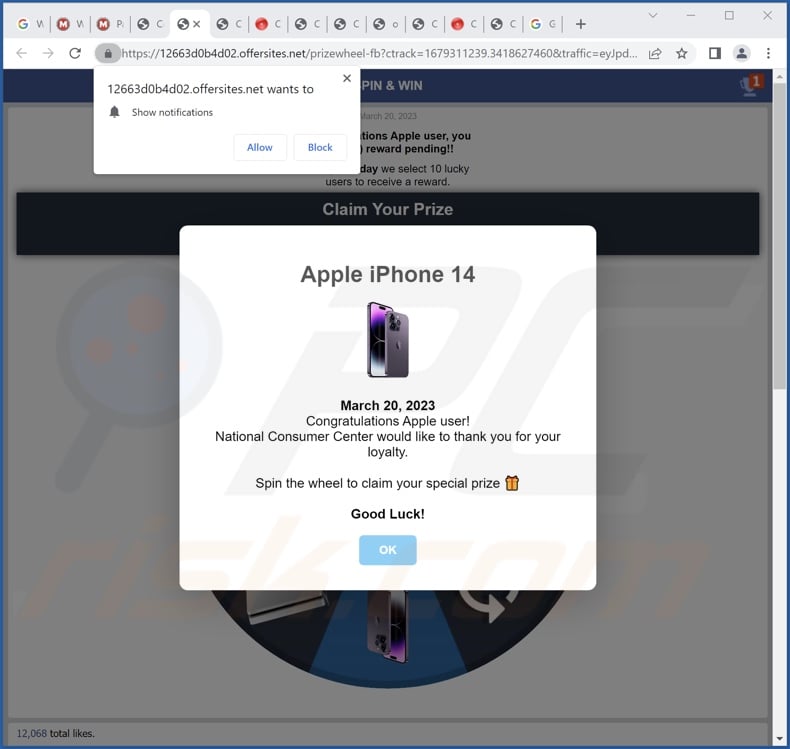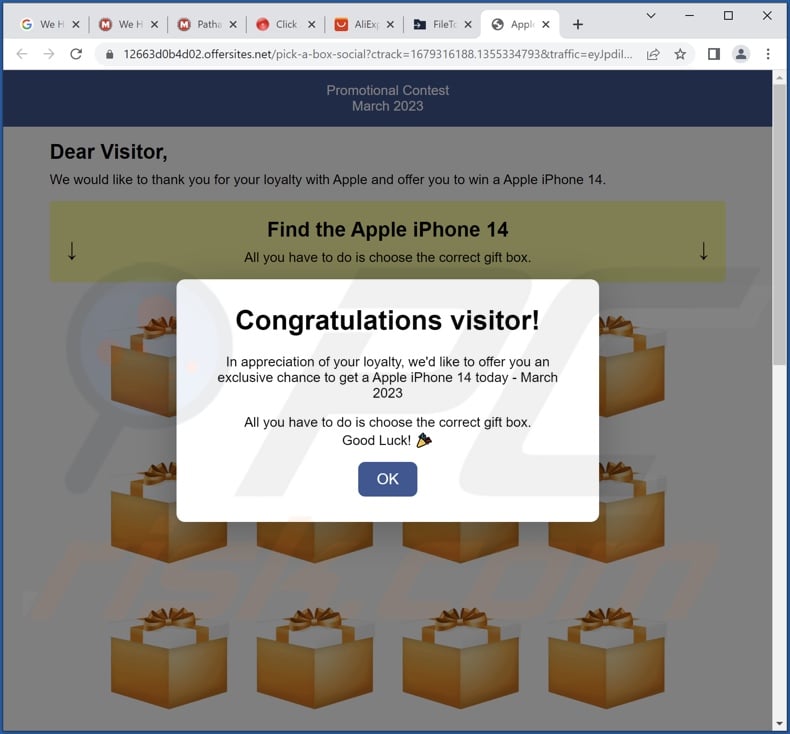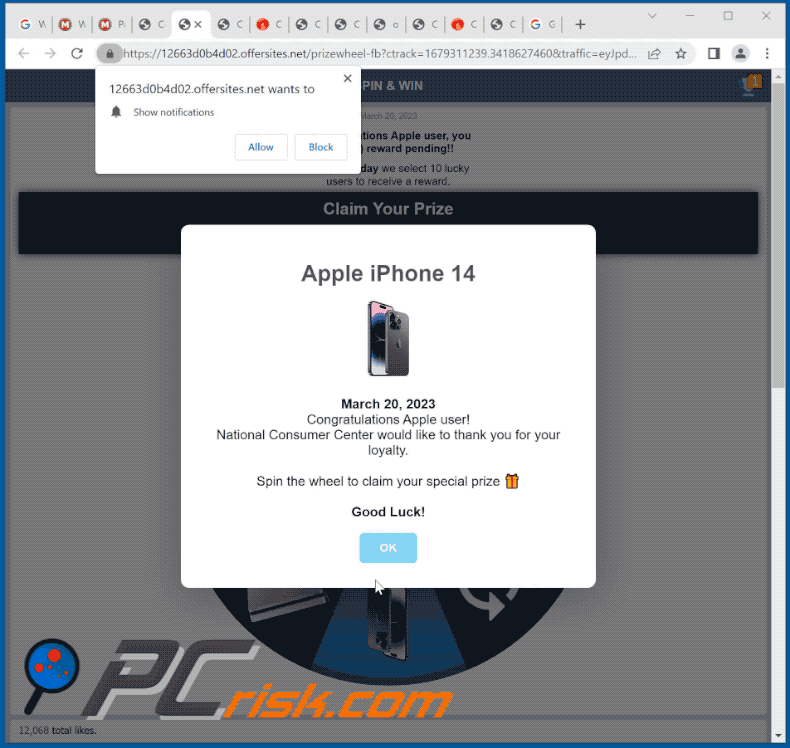Avoid getting scammed by sites claiming that you have won an Apple iPhone 14
Phishing/ScamAlso Known As: "Apple iPhone 14 Winner" pop-up
Get free scan and check if your device is infected.
Remove it nowTo use full-featured product, you have to purchase a license for Combo Cleaner. Seven days free trial available. Combo Cleaner is owned and operated by RCS LT, the parent company of PCRisk.com.
What kind of scam is "Apple iPhone 14 Winner"?
"Apple iPhone 14 Winner" is a scam promoted on deceptive websites. There are multiple variants of this scheme. The common theme is that the user has won an iPhone 14 or they are offered a chance to win the smartphone.
It must be stressed that these claims are fake and they are not associated with any legitimate entities.

"Apple iPhone 14 Winner" scam overview
At the time of writing, we had discovered two appearance versions of the "Apple iPhone 14 Winner" scam. One variant displayed a pop-up window congratulating the user. It stated that the "National Consumer Center" wishes to thank them for their loyalty. This scheme instructed the user to spin the wheel and claim their "special prize".
After the pop-up was closed, the user was presented with a prize wheel that they could click and spin. The text above stated that ten users are selected daily for a reward. When we tested this scam, the first try was "unsuccessful", and the second "won" an iPhone 14. Then the scheme presented a page containing fake testimonies of previous winners (in the form of Facebook-style comments).
At the time of research, after the "Claim Prize" button was pressed, the scam redirected to a page of the Chrome Web Store promoting the Sport Engine browser hijacker.
The other version also presented a pop-up window congratulating the visitor. The text therein offered the user a chance to win an iPhone 14 as a thank-you for their loyalty. The background page contained images of gift boxes, and the user was to click them to get a prize.
It must be mentioned that the "Apple iPhone 14 Winner" scam can use different appearance designs. Typically, schemes of this kind redirect to phishing websites that record the information entered into them. These sites tend to target log-in credentials, personally identifiable details, and/or finance-related data (e.g., banking account details, credit card numbers, etc.).
Alternatively, these scams can redirect to pages requesting payment for prize delivery/release (e.g., fake shipping, storage, transaction, or other fees). However, just like one of the "Apple iPhone 14 Winner" variants we inspected, such schemes could promote software or other content.
To summarize, by trusting a scam like "Apple iPhone 14 Winner" – users can experience system infections, serious privacy issues, financial losses, and identity theft.
| Name | "Apple iPhone 14 Winner" pop-up |
| Threat Type | Phishing, Scam, Social Engineering, Fraud |
| Fake Claim | User has won an Apple iPhone 14 |
| Distributed Unwanted Software | Sport Engine |
| Related Domains | offersites[.]net |
| Detection Names (offersites[.]net) | Sophos (Spam), Full List Of Detections (VirusTotal) |
| Serving IP Address (offersites[.]net) | 94.237.93.242 |
| Distribution methods | Compromised websites, rogue online pop-up ads, potentially unwanted applications. |
| Damage | Loss of sensitive private information, monetary loss, identity theft, possible malware infections. |
| Malware Removal (Windows) |
To eliminate possible malware infections, scan your computer with legitimate antivirus software. Our security researchers recommend using Combo Cleaner. Download Combo CleanerTo use full-featured product, you have to purchase a license for Combo Cleaner. 7 days free trial available. Combo Cleaner is owned and operated by RCS LT, the parent company of PCRisk.com. |
Similar scams examples
We have analyzed thousands of online scams; "TESCO Loyalty Program", "T-Mobile Customer Reward Program", "Walmart Loyalty Program", "BLACK WEEK Lottery", and "AMAZON TRIAL" are just some examples of ones similar to "Apple iPhone 14 Winner".
The Web is full of deceptive and malicious content. Various scam models and social engineering techniques are used to gain and subsequently abuse victims' trust. Popular themes include (but are not limited to): customer appreciation gifts, lotteries, giveaways, error/virus alerts, necessary updates, etc.
Due to how widespread scams are online, we strongly recommend exercising caution while browsing.
How did I open a scam website?
Scam sites are often accessed via webpages that use rogue advertising networks, either force-opened when one is initially entered or when hosted content is interacted with (e.g., clicking buttons, links, text input fields, ads, etc.).
Additionally, intrusive advertisements and spam browser notifications promote online scams. Misspelling a website's URL can also result in a redirect to a scam page. Adware pushes scams as well, i.e., by displaying ads endorsing them or by force-opening the webpages hosting this deceptive content.
How to avoid visiting scam websites?
It is paramount to be careful while browsing. We advise against using websites that offer pirated software/media or other questionable services (e.g., Torrenting, illegal streaming/downloading, etc.) – since they are usually monetized via rogue advertising networks.
We recommend paying attention to URLs and entering them with care. And to avoid receiving unwanted browser notifications – do not permit suspicious websites to deliver them (i.e., do not click "Allow", "Allow Notifications", etc.). Instead, deny notification requests (i.e., select "Block", "Block Notifications", etc.) or ignore them altogether.
We also advise downloading only from official/verified sources and approaching installation with caution (e.g., reading terms, exploring possible options, using "Custom/Advanced" settings, and opting out of all supplementary apps, extensions, tools, etc.) – to prevent bundled/harmful content from infiltrating the system.
If your computer is already infected, we recommend running a scan with Combo Cleaner Antivirus for Windows to automatically eliminate all threats.
Text presented in the "Apple iPhone 14 Winner" pop-up window:
Apple iPhone 14
March 20, 2023
Congratulations Apple user!
National Consumer Center would like to thank you for your loyalty.
Spin the wheel to claim your special prize
Good Luck!
[OK]
Screenshot of another variant of this scam:

Text presented in this variant's pop-up window:
Congratulations visitor!
In appreciation of your loyalty, we'd like to offer you an exclusive chance to get a Apple iPhone 14 today - March 2023
All you have to do is choose the correct gift box.
Good Luck!
[OK]
Appearance of a variant of the "Apple iPhone 14 Winner" pop-up scam (GIF):

Instant automatic malware removal:
Manual threat removal might be a lengthy and complicated process that requires advanced IT skills. Combo Cleaner is a professional automatic malware removal tool that is recommended to get rid of malware. Download it by clicking the button below:
DOWNLOAD Combo CleanerBy downloading any software listed on this website you agree to our Privacy Policy and Terms of Use. To use full-featured product, you have to purchase a license for Combo Cleaner. 7 days free trial available. Combo Cleaner is owned and operated by RCS LT, the parent company of PCRisk.com.
Quick menu:
- What is "Apple iPhone 14 Winner" pop-up?
- How to identify a pop-up scam?
- How do pop-up scams work?
- How to remove fake pop-ups?
- How to prevent fake pop-ups?
- What to do if you fell for a pop-up scam?
How to identify a pop-up scam?
Pop-up windows with various fake messages are a common type of lures cybercriminals use. They collect sensitive personal data, trick Internet users into calling fake tech support numbers, subscribe to useless online services, invest in shady cryptocurrency schemes, etc.
While in the majority of cases these pop-ups don't infect users' devices with malware, they can cause direct monetary loss or could result in identity theft.
Cybercriminals strive to create their rogue pop-up windows to look trustworthy, however, scams typically have the following characteristics:
- Spelling mistakes and non-professional images - Closely inspect the information displayed in a pop-up. Spelling mistakes and unprofessional images could be a sign of a scam.
- Sense of urgency - Countdown timer with a couple of minutes on it, asking you to enter your personal information or subscribe to some online service.
- Statements that you won something - If you haven't participated in a lottery, online competition, etc., and you see a pop-up window stating that you won.
- Computer or mobile device scan - A pop-up window that scans your device and informs of detected issues - is undoubtedly a scam; webpages cannot perform such actions.
- Exclusivity - Pop-up windows stating that only you are given secret access to a financial scheme that can quickly make you rich.
Example of a pop-up scam:

How do pop-up scams work?
Cybercriminals and deceptive marketers usually use various advertising networks, search engine poisoning techniques, and shady websites to generate traffic to their pop-ups. Users land on their online lures after clicking on fake download buttons, using a torrent website, or simply clicking on an Internet search engine result.
Based on users' location and device information, they are presented with a scam pop-up. Lures presented in such pop-ups range from get-rich-quick schemes to fake virus scans.
How to remove fake pop-ups?
In most cases, pop-up scams do not infect users' devices with malware. If you encountered a scam pop-up, simply closing it should be enough. In some cases scam, pop-ups may be hard to close; in such cases - close your Internet browser and restart it.
In extremely rare cases, you might need to reset your Internet browser. For this, use our instructions explaining how to reset Internet browser settings.
How to prevent fake pop-ups?
To prevent seeing pop-up scams, you should visit only reputable websites. Torrent, Crack, free online movie streaming, YouTube video download, and other websites of similar reputation commonly redirect Internet users to pop-up scams.
To minimize the risk of encountering pop-up scams, you should keep your Internet browsers up-to-date and use reputable anti-malware application. For this purpose, we recommend Combo Cleaner Antivirus for Windows.
What to do if you fell for a pop-up scam?
This depends on the type of scam that you fell for. Most commonly, pop-up scams try to trick users into sending money, giving away personal information, or giving access to one's device.
- If you sent money to scammers: You should contact your financial institution and explain that you were scammed. If informed promptly, there's a chance to get your money back.
- If you gave away your personal information: You should change your passwords and enable two-factor authentication in all online services that you use. Visit Federal Trade Commission to report identity theft and get personalized recovery steps.
- If you let scammers connect to your device: You should scan your computer with reputable anti-malware (we recommend Combo Cleaner Antivirus for Windows) - cyber criminals could have planted trojans, keyloggers, and other malware, don't use your computer until removing possible threats.
- Help other Internet users: report Internet scams to Federal Trade Commission.
Frequently Asked Questions (FAQ)
What is a pop-up scam?
Pop-up scams are deceptive messages intended to trick users into performing specific actions, e.g., disclosing private data, making monetary transactions, downloading/installing software, purchasing products, subscribing to services, and so on.
What is the purpose of a pop-up scam?
The goal of pop-up scams is to generate revenue. Scammers may profit by obtaining funds through deception, abusing or selling private data, promoting content, proliferating malware, etc.
I have provided my personal information when tricked by a scam, what should I do?
If you have provided your log-in credentials – change the passwords of all potentially exposed accounts and inform their official support without delay. And if you've disclosed other private information (e.g., ID card details, credit card numbers, etc.) – immediately contact relevant authorities.
Why do I encounter fake pop-ups?
Pop-up scams are promoted on deceptive websites, which are seldom accessed intentionally. Most enter them via redirects caused by sites using rogue advertising networks, mistyped URLs, spam browser notifications, intrusive ads, or installed adware.
Will Combo Cleaner protect me from pop-up scams?
Combo Cleaner is capable of scanning visited websites and detecting deceptive/malicious ones. Therefore, should you enter such a webpage – you will be warned immediately, and further access to it will be blocked.
Share:

Tomas Meskauskas
Expert security researcher, professional malware analyst
I am passionate about computer security and technology. I have an experience of over 10 years working in various companies related to computer technical issue solving and Internet security. I have been working as an author and editor for pcrisk.com since 2010. Follow me on Twitter and LinkedIn to stay informed about the latest online security threats.
PCrisk security portal is brought by a company RCS LT.
Joined forces of security researchers help educate computer users about the latest online security threats. More information about the company RCS LT.
Our malware removal guides are free. However, if you want to support us you can send us a donation.
DonatePCrisk security portal is brought by a company RCS LT.
Joined forces of security researchers help educate computer users about the latest online security threats. More information about the company RCS LT.
Our malware removal guides are free. However, if you want to support us you can send us a donation.
Donate
▼ Show Discussion